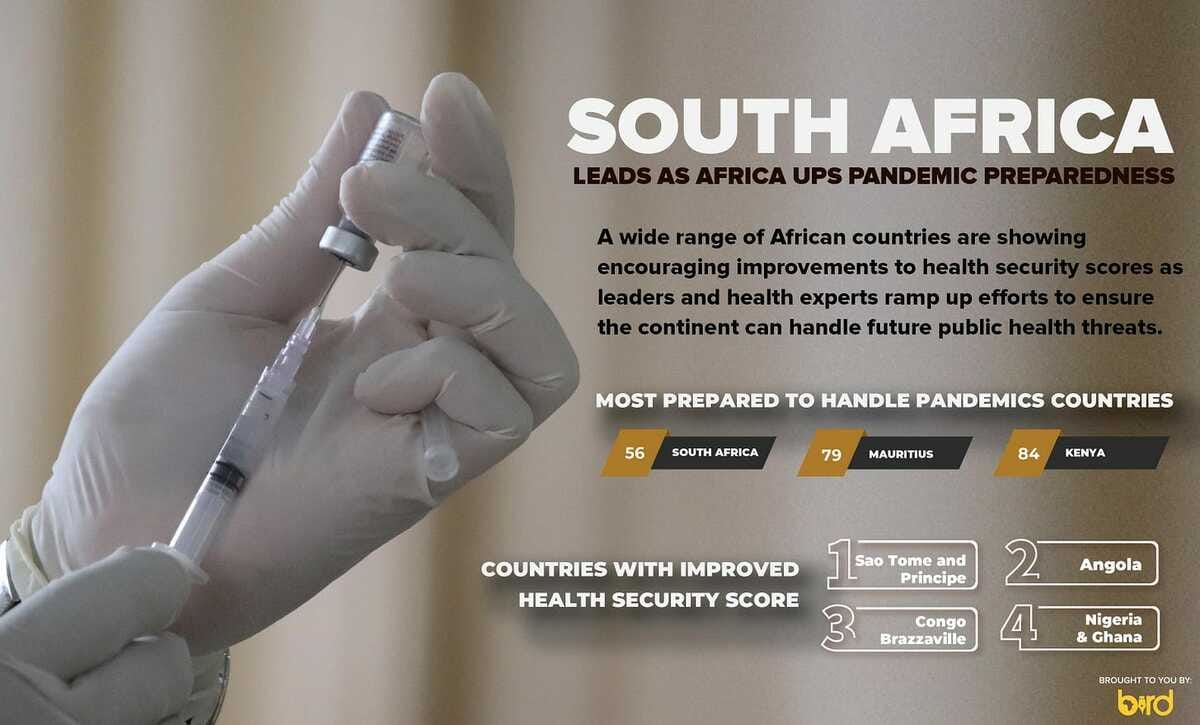
## A wide range of African countries are showing encouraging improvements to health security scores as leaders and health experts ramp up efforts to ensure the continent can handle future public health threats.
By Conrad Onyango, bird
South Africa is the African country most prepared to handle pandemics and epidemics, followed by Mauritius and Kenya, while the entire world remains “dangerously unprepared” to meet future health threats, according to a new report.
South Africa is ranked at position 56 among 195 countries in terms of preparedness across six metrics used in the 2021 Global Health Security Index.
Together with Mauritius (79) and Kenya (84), these are the top African countries, with scores within the global average.
“As a measure of health security, the index assigns the highest score to countries with the most extensive capacities to prevent and respond to epidemics and pandemics,” said the report.
South Africa, came in at position 9 globally for its rapid response to and mitigation of spread of, epidemics, and scored highly in early detection and reporting of epidemics of an international nature, as well as prevention of emergence - or release of - pathogens.
Mauritius had Africa's best score in overall risk environment and country vulnerability to biological threats while Kenya also scored highly in early detection and reporting epidemics of potential international concern and on commitments to improving national capacity, financing plans to address gaps and adherence to global norms.
Though Nigeria (86) and Ghana (104) did not hit the global health security average score, they improved their overall scores.
The two countries are among those that led the continent in strengthening epidemic preparedness and response through the development of state-of-the-art medical facilities and innovation of technologies in genetic research.
A number of lowly-ranked African countries also recorded improvement in their health security indices, suggesting they are also playing catch-up by expanding their preparedness capacities.
Sao Tome and Principe recorded the biggest overall improvement, with an overall 5.7 point rise driven by a 14.4 point rise on its prevention index score that moved it up 50 spots on this category, followed by Angola's 3.9 point rise and Congo Brazzaville with 2.4 point rise.
The index, designed to inform and prepare global leaders on how to mitigate future outbreaks, said the COVID-19 pandemic has demonstrated the inadequacy of current global capacities.
Overall, 178 countries scored less than 50 points out of the possible 100 points for whole-of-government biosecurity systems, training, personnel vetting, transport of infectious substances and cross-border transfer and screening.
Moreover, the report said that many of the new capacities built by countries during the COVID-19 pandemic were temporary and short term.
“Leaders now have a choice. Will they sustain new capacities and use the resources and attention generated by COVID-19 to fill in the remaining preparedness gaps for the long term- or will they fall back into the decades-long cycle of panic and neglect that will leave the world at grave risk for the inevitable health threats of the future?” asked the authors of the report.
Latest developments on the continent suggest that Africa has resolved to filling gaps in preparedness with plans to build local capacity to manufacture vaccines as well as foster a culture of collaboration to avert unforeseen crises.
This week, the African Union (AU) and the Africa Centres for Disease Control and Prevention (Africa CDC) advanced the quest for early preparedness by opening the first international Conference on Public Health in Africa (CPHIA 2021).
The conference, which brings African Heads of State and Government, dignitaries and leading health experts together, aims to accelerate progress against COVID-19 and chart a new path forward for public health on the continent.
“CPHIA 2021 will provide the platform to both highlight their incredible contributions and allow for strengthened collaboration across sectors so we can better respond to current and future health crises and achieve health equity,” said CPHIA 2021 Co-Chair and Vice-Chancellor of the University of Global Health Equity, Professor Agnes Binagwaho.
Less than 20 African countries met the global goal of vaccinating at least 10 percent of the adult population by 30 September 2021, with only 7 percent of the African population being fully vaccinated as at December 3.
The full report can be found here.
bird